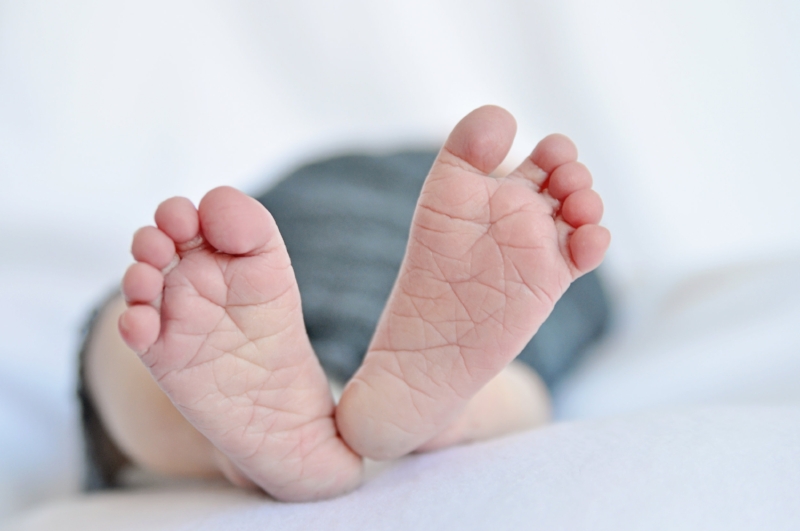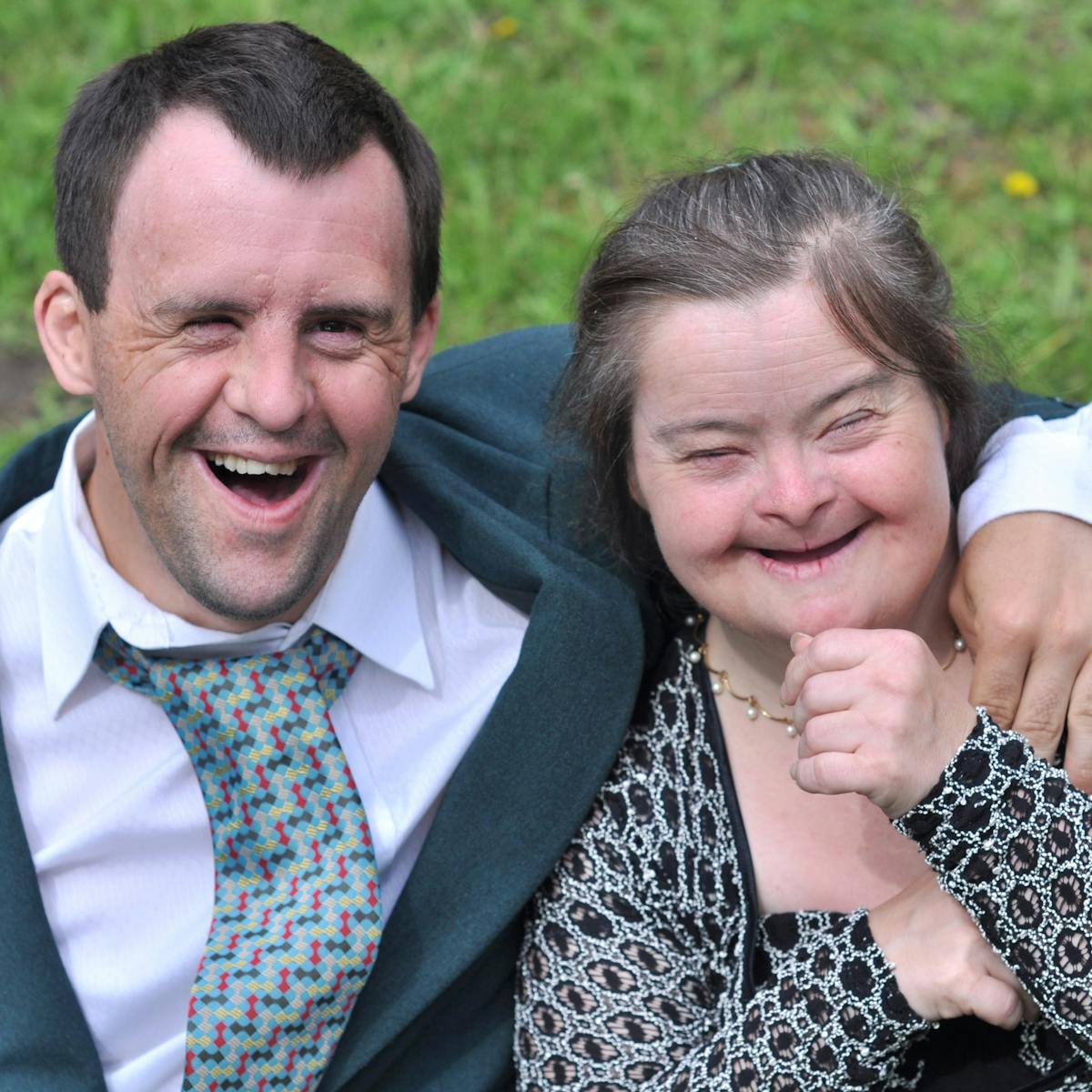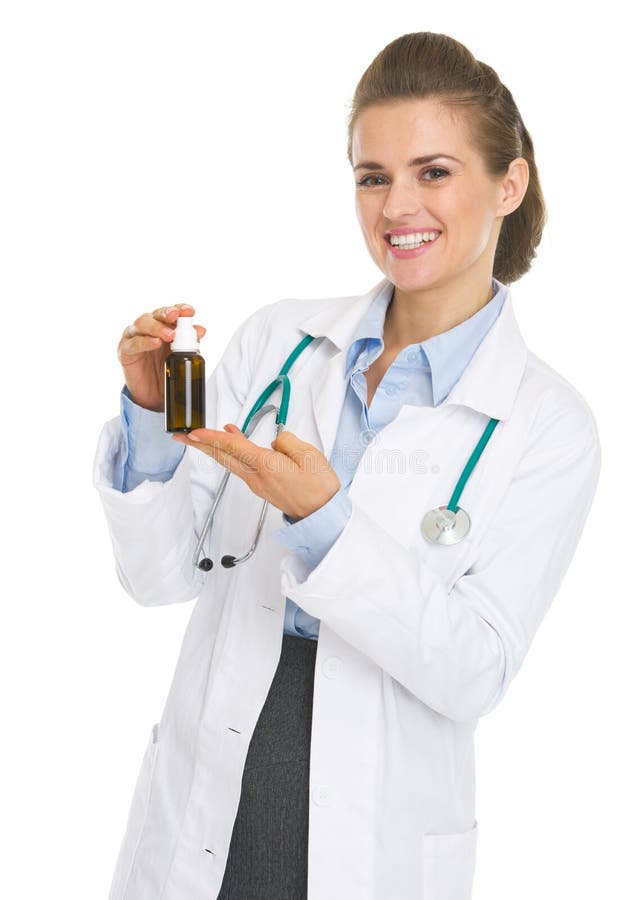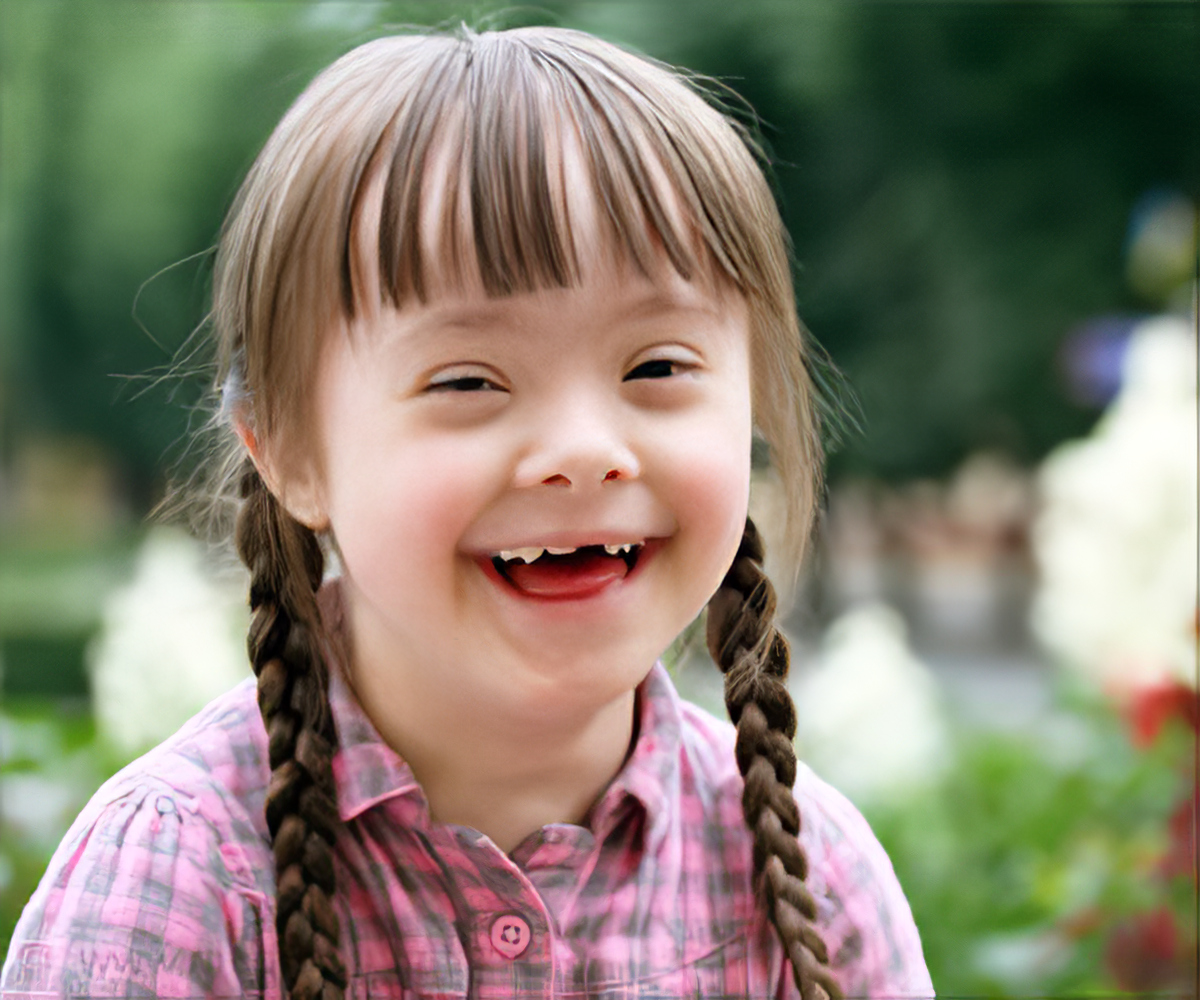Down syndrome is a genetic disorder and the most common autosomal chromosome abnormality in humans, in which extra genetic material from chromosome 21 is transferred to a newly formed embryo. The extra genetic material causes changes in the development of the embryo and fetus resulting in physical and mental abnormalities. Each person with Down syndrome is unique and there can be great variability in the severity of symptoms.
The most common type of Down syndrome is trisomy 21 and Mosaic Down syndrome is the rare type of Down syndrome.
Down syndrome is caused by the presence of an extra chromosome. Normally, the human body has 23 pairs of chromosomes (called autosomes) and two sex chromosomes (allosomes). At conception, a new cell is formed that receives one copy of each chromosome from the sperm and one copy from the egg. The new cell divides and multiplies to form an embryo and ultimately a fetus and new human. Each cell contains the exact same genetic material as the original 46 chromosomes, carrying the same genes and DNA.
What causes Down syndrome?
In people with Down syndrome, an error occurs in the coming together of chromosome 21. The extra genetic material is responsible for the developmental abnormalities that occur. Instead of 46 chromosomes, there are 47.
The most common error in chromosome replication is trisomy 21, where the new cell gets three copies of chromosome 21, instead of two. This accounts for about 95% of those patients with Down syndrome. Translocation describes a less common event where an extra piece of chromosome 21 gets attached to another chromosome, again delivering more genetic material to the new cell than is needed.
Mosaic Down syndrome
Mosaic Down syndrome occurs when there is a combination of cells with the normal number of chromosomes (46+2) mixed together with those containing a third chromosome 21 (47+2).
Note: +2 is the plus two sex chromosomes. The cells with normal chromosomes can moderate the effect of the trisomy 21 cells and modify the effect on the patient’s physical and mental development.
Genotype is the term used to describe the genetic makeup of a person and for most people with Down syndrome, it is 47+2. Phenotype describes the physical and functional capabilities of a patient. In individuals with Down syndrome, there is great variability in phenotype.
Down Syndrome Symptoms
The baby with Down syndrome has a hallmark appearance. However, every aspect of the appearance does not need to be present as the phenotype, the way the genes make the child look, can be markedly different for each patient.
Six common Down syndrome symptoms are:
- there are a small head and short neck,
- a flat face, and upward slanting eyes,
- ears are flat and positioned lower than “normal,”
- the tongue protrudes and seems to be too large for the mouth,
- hands tend to be wide, with short fingers and there is just a single flexion crease in the palm,
- joints tend to be more flexible and muscles may lack tone.
Physical growth
- The patient may have growth retardation and though a baby may be normal size, will not grow as tall.
- The average height for an adult male with Down syndrome is 5+ft, and for a female it is 4+ft.
- Bow leggedness is common.
- Obesity occurs with aging.
Mental function
- There is decreased mental function, and the IQ may range from mild disability (50 to 70) to moderate (35 to 50).
- For patients with Mosaic Down syndrome, IQ can be 10 to 30 points higher.
- There can be language development delay both from hearing impairment and speech delay.
- Gross motor skills like crawling and walking can be slow to mature and fine motor skills may take time to develop.
Two early pregnancies Down syndrome tests
Most often, Down syndrome is diagnosed while the fetus is still in the uterus.
In the first and second trimesters of pregnancy, blood tests and ultrasound may be used to screen for not only Down syndrome but also spina bifida and other genetic abnormalities.
Should these screening tests show the potential for Down syndrome, specific diagnostic tests may be considered. These include the following:
- Amniocentesis: A needle is placed using ultrasound guidance into the uterus to obtain a sample of the amniotic fluid that surrounds the fetus. The fetus’ chromosomes can be analyzed, looking for trisomy 21.
- Chorionic villus sampling: Cells are taken from the placenta for fetal chromosome analysis.
There is a risk of miscarriage with these tests. The decision as to which test might be best and when it should be done depends upon the situation.
At birth, Down syndrome is usually diagnosed by the appearance of the newborn and the health care professional will likely order a chromosome analysis to confirm the diagnosis.
Allopathic treatment for Down syndrome
In Allopathy, there is not any treatment for down syndrome, not before nor after birth.
Providing support and treatment for a patient with Down syndrome is meant to improve their quality of life.
Infants with Down syndrome may experience developmental delays including time to sit, crawl, walk, and talk so parents need to know that developmental delays are common in children with Down syndrome. Using a team approach to care, physical therapists, occupational therapists, and speech therapists may help improve language, motor, and social skills to the maximum achievable by the individual person.
Medical conditions associated with Down syndrome, including those affecting the heart and the gastrointestinal system, may require evaluation and care, sometimes requiring surgery.
As the patient ages, the care and support needed will depend upon the intellectual ability and physical function achievable by that individual.
Homeopathic treatment for Down Syndrome
In Homeopathy, there are very little chances to treat down syndrome after six months of gestation and after birth; in first six or 5+ months of pregnancy, it is possible to treat down syndrome completely.
Spouses with down syndrome in their family (s) could take these medicines as a prophylactic during at least first six-seven months of pregnancy’s.
After delivery kids with down syndrome should be advisees these Homeopathic medicines in very little amount of water.
The following medicines are very effective for down syndrome:
Agaricus Muscarious and Agaricus Emeticus
Other symptoms of Agaricus Musc are jerking, twitching, trembling, and itching are strong indications. Incipient phthisis; is related to the tubercular diathesis, anemia, chorea, twitching ceases during sleep. Various forms of neuralgia and spasmodic affections, and neurotic skin troubles. Down syndrome. Various forms of cerebral congestion. Paralysis of lower limbs, with spasmodic condition of arms. Numbness of legs.
Cimicifuga Racemosa
Has a wide action upon the cerebrospinal and muscular system, as well as upon the uterus and ovaries. Useful in rheumatic, nervous subjects with ovarian irritation, uterine cramps and heavy limbs. Down syndrome. Muscular and crampy pains, primarily of neurotic origin, occurring in nearly every part of the body. Pains like electric shocks here and there. PCOS/D.
Aurum Metallicum
Feeling of self-condemnation and utter worthlessness. Profound despondency, with increased blood pressure, with thorough disgust of life, and thoughts of suicide. Talks of committing suicide. Great fear of death. Peevish and vehement at least contradiction. Down syndrome. Anthropophobia. Mental derangements.
Calceria Phosphorica
Children who are peevish, flabby, have cold extremities and feeble digestion. It has a special affinity where bones form sutures or symphyses, and all its symptoms are worse from any change of weather. Numbness and crawling are characteristic sensations, and tendency to perspiration. Peevish, forgetful; after grief and vexation. Fontanelles remain open too long. Cranial bones soft and thin. Defective hearing. Diffused opacity in cornea following abscess. Down syndrome.
Capsicum
Rheumatic pain in limbs. Tension in the knees and stiffness in the calves of the legs on walking. Stiffness of the arms and legs, with tingling as when they are asleep. Shooting-tearing from hip to knee and foot. Down syndrome. Drawing pains in the limbs excited by movement. laxness of the muscles.; bloatedness of the skin. Affections of the bones.
Hyoscimus
Chorea. Coma vigil. Dysmenorrhea. Enteric fever. Epilepsy. Epistaxis. Erotomania. Eyes, affections of. Hemoptysis. Hypochondriasis. Lochia, suppressed. Mania. Meningitis. Mind, affections of. Neuralgia. Night-blindness. Nymphomania. Paralysis. Paralysis agitans. Stupor. Delirium tremens with trembling, and fits of epileptic convulsions. Inflammation of the brain, with unconsciousness; heat and tingling in the head; violent pulsation in the head, like waves. Hydrocephalus. Eyes downcast and dull, eyes red, fixed, convulsed, and prominent sometimes Spasmodic movement. Myopia, or presbyopia. Paralysis. Jerking of the tendons. Down syndrome. Trembling of the arms/hands. Painful numbness and stiffness of hands. Carphologia (picking of the bed cover or of the face). Incisive tearing, and dull pulling in the limbs and joints. Jerking of the feet.
Tarentula Hispanica
Remarkable nervous phenomena; hysteria with chlorosis; chorea, dysmenorrhea, spinal irritability. Bladder tenesmus. Constriction sensations. Formication; Extreme restlessness; must keep in constant motion even though walking aggravates. Hysterical epilepsy. Intense sexual excitement. Hysteria. Intermittent. Kleptomania. Levitation. Locomotor ataxia. Mania. Menir’s disease. Migraine. Onanism. Ovaries, enlargement of. Paralysis; agitans. Pyometra. Proctalgia. Pruritus pudenda. 
Mind: Sudden alteration of mood. Foxy. Destructive impulses; moral relaxation. Must constantly busy herself or walk. Sensitive to music. Averse to company but wants someone present. Ungrateful, discontented. Guided by whims. Hysteria. Numbness, and dullness. Necessity to move legs extends to hands with desire of taking something and throwing it away. Uneasiness of legs must keep moving them. Weakness of legs.
Head: Intense pain, as if thousands of needles were pricking into brain. Vertigo. Wants hair brushed or head rubbed. Headache flies to forehead and occiput with photophobia. Ill humor, oppressive breathing and desire to pull out her/his hair. Down syndrome.
Nymphomania; reflex chorea; hyperemia and hyperesthesia of female sexual organs. Fibrous tumor of uterus with bearing-down pains. Disorders of pregnancy.
Phosphorus
Fearfulness, Numbness of legs followed by paralysis. Convulsive shaking and twitching. Trembling of all limbs. Intense restlessness. Over-sensitive to external impressions. Loss of memory. Memory. Paralysis of the insane. Ecstasy. Chronic congestion of head. Vertigo. Hearing difficult, especially to human voice. Ascending sensory and motor paralysis from ends of fingers and toes. Down syndrome.
Female: Metritis. Chlorosis. Phlebitis. PCOS/D. Leucorrhea.
Silicea Terra
Imperfect assimilation and consequent defective nutrition. It goes further and produces neurasthenic states in consequence, and increased susceptibility to nervous stimuli and exaggerated reflexes. Diseases of bones, caries and necrosis. Epilepsy. Down syndrome. Ill effects of vaccination. Yielding, faint-hearted, anxious. Nervous and excitable. Sensitive to all impressions. Brain-fag.
Itching of vulva and vagina; very sensitive. Discharge of blood between menstrual periods. Increased menses, with paroxysms of icy coldness over whole body. Nipples very sore; ulcerated easily; drawn in. Fistulous ulcers of breast. Abscess of labia. Discharge of blood from vagina every time child is nursed. Vaginal cysts. Paralytic weakness of arms.
Kali Phosphoricum
Morose, irritable; tearful; averse to be talked. Cannot recall names or words; mind sluggish but will act if aroused. Down syndrome. Extreme lassitude and depression; apprehensive. Loss of memory. Exhaustion after moderate mental effort. Hearing too sensitive; cannot endure noise. Twitching of muscles of arms and fingers.
PCOS/D. Leucorrhea with pus, sometimes with blood. Bloody discharges during pregnancy.
Kali Bromatum
Epilepsy. Down syndrome. Erythema nodosum. General paralysis of insane. Impotence. Locomotor ataxia. Ovaries, affections of. Paralysis. Paralysis agitans. Unconscious of what is occurring around. Head heaviness, confusion; slow speech; staggers. Memory growing weak.
Ferrum Cyanatum
Neuroses with irritable weakness and hypersensitiveness, especially of a periodical character; epilepsy; cardialgia, with nausea, flatulence, constipation, alternating with diarrhea; chorea. Down syndrome.
Aconitinum
Vertigo and confusion, with tinnitus (ringing in ears). Dimness of vision, Muscular weakness. Complete blindness; accompanying dilatation of pupils, sight returning when pupils contract. Vision hazy, with giddiness and nausea. Down syndrome. Weakness, trembling, burning, creeping, tingling, numbness of limbs. Malaise; feebleness; muscular prostration. Twitching and convulsions over whole body.
Coffea Cruda
Gelsemium Sempervirens
Centers its action upon the nervous system, various degrees of motor paralysis. General prostration. Dizziness, drowsiness, dullness, and trembling. Slow pulse, tired feeling, mental apathy. Paralysis of various groups of muscles about the eyes, throat, chest, larynx, sphincter, extremities, etc. Post-diphtheritic paralysis. Muscular weakness. Complete relaxation and prostration. Lack of muscular co-ordination. Down syndrome. General depression from heat of sun. Nervous affections in children of cigarettes/cigarmakers. Desire to be quiet, to be left alone. Dullness, languor, listless. Absolute lack of fear. Headache, with muscular soreness of neck and shoulders. Headache preceded by blindness.
Dull, heavy pain. Complete relaxation of the whole muscular system. Languor; muscles feel bruised. Every little exertion causes fatigue. Pain in neck, especially upper sterna – cleido muscles. Dull aching in lumbar and sacral region, passing upward. Pain in muscles of back, hips, and lower extremities, mostly deep-seated.
Loss of power of muscular control. Cramp in muscles of forearm. Professional neuroses. Writer’s cramp. Excessive trembling and weakness of all limbs. Hysteric convulsions. Fatigue after slight exercise.
Female Rigid. Vaginismus. False labor-pains; pains pass up back. Dysmenorrhea, with scanty flow; menses retarded. Pain extends to back and hips. Aphonia and sore throat during menses. Sensation as if uterus were squeezed.
Male Scrotum continually sweating. Gonorrhea, first stage; discharge scanty; tendency to corrode; little pain, but much heat; smarting at meatus.
Oxalic Acid
Meningitis. Myelitis. Convulsions. Neuralgia. Neurasthenia. Numbness. Oxaluria. Paralysis. Pregnancy sickness. Tetanus. Diminished power to concentrate ideas. Great cheerfulness and clearness of mind. Very much exhilarated; quicker thought and action. Down syndrome.
Male: Great increase of sexual desire. Red points on glans without itching or soreness. Sensation of heaviness and contusion in testicles. Terrible neuralgic pain in cords.
Female: Much burning pain in genital organs. During pregnancy, nausea and painful vomiting, a tormenting, cramp-like feeling between pit of stomach and navel; sour taste, heartburn, and GERD.
8 Potential complications
The extra genetic material can affect all organs in the body and complications may arise at birth or may present later in life. The eight potential complications of Down syndrome include:
- Congenital heart disease may affect up to 50% of patients. Most commonly found are endocardial cushion defects (also known as atrial septal defects) and ventricular septal defects. Both are “holes” in the walls that connect the upper (atrium) and lower (ventricle) chambers of the heart.
- There can be many abnormalities of the gastrointestinal tract, including duodenal atresia (failure for the first part of the small intestine to fully develop), imperforate anus, and Hirschsprung’s disease where the nerves to the anus fail to develop appropriately. Gastroesophageal reflux is common and may lead to aspiration of stomach contents into the lungs leading to recurrent pneumonia. Celiac disease is common in Down syndrome.
- Common eye problems include nearsightedness, astigmatism, and strabismus (imbalanced eye muscles). Cataracts can develop in utero and lead to blindness. Glaucoma, which causes increased eye pressure, is also seen. Tear ducts may be blocked leading to recurrent eye infections.
- Because of the abnormal facial anatomy, recurrent ear infections are common and can lead to deafness. As well, the large tongue and smallmouth are potential risk factors for developing sleep apnea.
- Patients with Down syndrome is more prone to autoimmune diseases including hypothyroidism, diabetes, and celiac disease.
- Children are more prone to infections.
- Patients with Down syndrome have a higher risk to develop leukemia.
- There is an increased risk for cervical spine instability, especially at the atlantoaxial junction, the joint that connects the first and second vertebrae in the neck. This can potentially be dangerous should there be subluxation or excessive movement that can damage the spinal cord. Most children will require a neck X-ray only if they will be participating in sports such as the Special Olympics. Scoliosis, hip dislocations, and knee laxity are other orthopedic issues that are prevalent.
Prognosis
With an increased understanding of potential underlying illnesses associated with Down syndrome and with increased support within the community for patients and families, the quality of life for the patient has increased in recent years.
- There is great variability in mental function between patients, but for those with the appropriate mental capacity, the ability to complete an education, live and work independently.
- Down syndrome patients tend to age more quickly and are prone to developing Alzheimer’s disease, often as young as age 40.
- Those patients who maintain their mental capacity tend to have a longer life span.
- A poorer prognosis is found in those patients who develop dementia, lose their ability to perform daily physical activities, and those who have decreased vision.
Life expectancy
- Because of the many physical complications associated with chromosomal abnormalities, many fetuses with trisomy 21 fail to develop properly and are miscarried.
- There is an increased risk of infant death in the first year of life because of congenital heart disease (failure of the heart to develop normally) and respiratory infections.
- Given the challenges in the infant years, people with Down syndrome have experienced increased life expectancy as recognition and treatment of underlying medical conditions improve.
- A person with Down syndrome can expect a life span of 50 years and more, depending upon the severity of underlying medical issues.
Is it possible to prevent Down syndrome?
Yes. It is possible to prevent down syndrome in your next generation. Researchers estimated that the Y chromosome has lost over 900 active genes over 166 million years, said Dr Qaisar Ahmed.
Down syndrome is not an illness or disease to be prevented but instead, an unexplained error in replicating DNA, genes, and chromosomes at the earliest stages of embryo development.
Risk factors for Down Syndrome
- There is a relationship between the age of the mother and the risk of having a child with Down syndrome. The overall frequency of a Down child is approximately 1 in 691 live births, but the older the mother, the higher the frequency. For mothers 34 years old and younger, Down syndrome frequency is 1 in 1,500 live births and the frequency gradually rises, so that for mothers older than age 30, it is 2 in 50 live births.
- For couples who have a child with Down syndrome, there is an increased risk to have a second child with Down syndrome.
- Women with Down syndrome is capable of becoming pregnant and are at increased risk of having another child with Down syndrome.
P. S: This article is only for doctors having good knowledge about Homeopathy and allopathy, for learning purpose(s).
For proper consultation and treatment, please visit our clinic.
None of above-mentioned medicine(s) is/are the full/complete treatment, but just hints for treatment; every patient has his/her own constitutional medicine.
To order medicine by courier, please send your details at WhatsApp– +923119884588
 Dr. Sayyad Qaisar Ahmed (MD {Ukraine}, DHMS), Abdominal Surgeries, Oncological surgeries, Gastroenterologist, Specialist Homeopathic Medicines.
Dr. Sayyad Qaisar Ahmed (MD {Ukraine}, DHMS), Abdominal Surgeries, Oncological surgeries, Gastroenterologist, Specialist Homeopathic Medicines.
Senior research officer at Dnepropetrovsk state medical academy Ukraine.
Location: Al-Haytham clinic, Umer Farooq Chowk Risalpur Sadder (0923631023, 03119884588), K.P.K, Pakistan.
Find more about Dr Sayed Qaisar Ahmed at:
https://www.youtube.com/Dr Qaisar Ahmed

